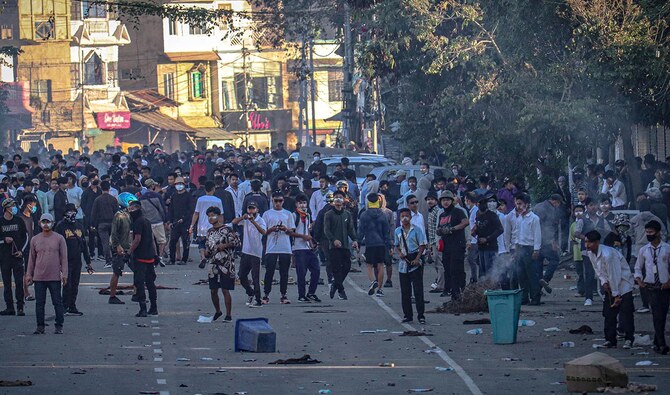The situation in Manipur, India, has deteriorated as ethnic violence intensifies, resulting in the deaths of six individuals.
Ethnic violence in the northeastern Indian state of Manipur has escalated, leading to the tragic deaths of six people in early September 2024. The ongoing conflict, which pits two major ethnic communities—the Meitei and the Kuki—against each other, has plunged the region into turmoil, with deep-seated tensions flaring into open violence. This latest round of bloodshed highlights the severe ethnic divisions that continue to destabilize the state, affecting thousands of lives and drawing national and international concern.

Background: Ethnic Tensions in Manipur
Manipur, a small state in India’s northeastern region, has long been home to a delicate balance of different ethnic groups, most notably the Meitei, who predominantly inhabit the Imphal Valley, and the Kuki, who live primarily in the surrounding hill areas. The Meitei community, who make up over half of the population, have historically been dominant in the state’s political and economic affairs, while the Kuki and other tribal groups have felt marginalized.
Ethnic tensions between the Meitei and the Kuki have simmered for decades, but they erupted into full-blown violence in May 2023, after the Manipur High Court suggested granting the Meitei community Scheduled Tribe status, a legal recognition that would give them access to special privileges and resources, such as land rights and government jobs. The Kuki and other tribal communities viewed this move as a direct threat to their land ownership and cultural identity, sparking widespread protests and clashes across the state.
Since May 2023, violence has become a regular occurrence in Manipur, with reports of arson, destruction of property, and killings. While the central government has deployed security forces to restore peace, the underlying ethnic tensions remain unresolved, leading to periodic outbreaks of violence.
The September 2024 Incident: Fresh Violence Erupts
The latest bout of violence in Manipur saw six people killed in a series of clashes between the Meitei and Kuki communities. The incidents occurred across multiple locations in the state, with reports of gunfire, arson, and looting adding to the chaos. According to local authorities, the violence was triggered by a series of provocations, including inflammatory social media posts and rumors about land disputes between the two communities.
In response, the Manipur government imposed curfews in several districts and increased security measures, deploying additional troops to the affected areas. However, tensions remain high, and sporadic violence continues, with many fearing that the conflict could spiral further out of control.
A Kuki community leader described the situation as “unbearable,” stating that their people were being attacked in their homes and villages. On the other hand, representatives from the Meitei community have argued that they are also under threat, with militants from the hill tribes attacking their neighborhoods in retaliation. The cyclical nature of the violence has made it difficult for the government and security forces to maintain lasting peace in the region.
Humanitarian Crisis and Displacement
The ongoing violence has displaced tens of thousands of people from their homes. Since the start of the conflict in May 2023, an estimated 60,000 people have fled their villages, seeking refuge in relief camps or neighboring states. These internally displaced persons (IDPs) face dire conditions, with limited access to food, clean water, and healthcare.
The humanitarian crisis in Manipur has drawn the attention of national and international human rights organizations, who have called for immediate action to protect civilians and provide aid to those affected by the violence. Local NGOs and civil society groups have also stepped in, but the scale of the displacement has overwhelmed available resources.
In addition to the physical toll, the violence has taken a significant psychological toll on the people of Manipur. Schools have been closed for extended periods, businesses have shuttered, and the constant threat of violence has left communities in a state of fear and anxiety. Many families are living in temporary shelters, uncertain of when they will be able to return to their homes.
Government Response and Calls for Peace
The Indian government has faced criticism for its handling of the situation in Manipur. While the deployment of additional security forces has brought temporary relief in some areas, critics argue that the government has failed to address the root causes of the conflict, particularly the deep-seated grievances of the Kuki and other tribal groups.

Prime Minister Narendra Modi has called for peace and dialogue, but his government’s response has been seen as inadequate by many observers. Opposition leaders have accused the government of being slow to intervene, and there have been calls for the appointment of a special envoy or mediator to facilitate talks between the warring factions.
In the wake of the recent violence, several national political leaders and human rights activists have urged both communities to lay down their arms and engage in dialogue to find a peaceful resolution to the conflict. The need for a long-term political solution that addresses the grievances of both the Meitei and Kuki communities is becoming increasingly urgent.
Conclusion
The latest escalation of ethnic violence in Manipur underscores the fragility of peace in a region that has been plagued by conflict for decades. The deaths of six people in the recent clashes are a grim reminder of the human cost of unresolved ethnic tensions. As the central and state governments grapple with restoring order, the priority must be to protect civilians, provide humanitarian aid to those affected, and foster a meaningful dialogue between the Meitei and Kuki communities. Only through sustained efforts at reconciliation and addressing the root causes of the conflict can lasting peace be achieved in Manipur.

